![]()
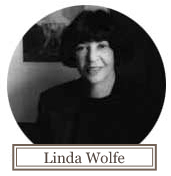 After a “totally relaxing” summer hiatus in Provence, FOF book critic Linda Wolfe, the award-winning author of 10 books and a 12-year veteran of the National Book Critics Circle, is back. “Help, help! Autumn! So much to do! It’s as if I never went away,” she says. “All that inner peace has vanished, I’m making lists in my head all day long, and I only have two cures: yoga and, you guessed it, reading.” Find out five books that she wants to share with you this fall, and enter for a chance to win one.
After a “totally relaxing” summer hiatus in Provence, FOF book critic Linda Wolfe, the award-winning author of 10 books and a 12-year veteran of the National Book Critics Circle, is back. “Help, help! Autumn! So much to do! It’s as if I never went away,” she says. “All that inner peace has vanished, I’m making lists in my head all day long, and I only have two cures: yoga and, you guessed it, reading.” Find out five books that she wants to share with you this fall, and enter for a chance to win one.
Enter to win the book of your choice, by answering in the comments, below: Which one of Linda’s fall picks would you most like to read?
![]()
Fifty Writers on Fifty Shades of Grey
Edited by Lori Perkins
Smart Pop Books. 384 pages.
This book is something of a grab bag, and if you’ve ever been to a grab bag party, you know that you’re liable to find yourself with something that’s just what you wanted, but just as liable to get something you consider tasteless or even ugly. It’s an anthology of reflections on, opinions about, and digressions related to “Fifty Shades of Grey.” That book has sold 32 million copies in the U.S. alone, has been translated into scores of languages, and been on the New York Times bestseller list since last April. “Everywhere you go,” writes the anthology’s editor, Lori Perkins, a literary agent and the former editorial director of a publishing company called Ravenous Romance, “people are talking about “Fifty Shades,” from the supermarket (where it is on sale!) to the airport to PTA meetings and even church socials.” The fifty writers whose essays she has collected here run the gamut from fans of the book to rivalrous writers enraged by E.L. James’s success, to other writers who here offer their own erotic fantasy stories –notably, one from Judith Regan, former HarperCollins publishing maven, that involves wreaking sexual vengeance on a male higher-up in an act that’s worthy of Lisbeth Salander.
You’ll also find a piece by Tish Beaty, the woman who edited “Fifty Shades.” Beaty reports first encountering James’s story when it was called “Master of the Universe” and appeared in installments on a website called fanfiction.net. From the first chapter, she reports, “I was drawn to Ana’s unbelievable innocence, and found Christan’s ability to take command of Ana in the bedroom, and otherwise, a huge turn-on.”
In “The Byronic Hero,” a poet and English professor named Jennifer Sanzo analyzes the book’s literary pedigree. “Originating with Lord Byron’s Childe Harold’s Pilgrimage,” Sanzo writes, “the term ‘Byronic hero’ is defined by the “Oxford Dictionary of Literary Terms” as a ‘boldly defiant but bitterly self-tormenting outcast…suffering from some unnamed sin.’ In other words, he’s a sexy bad ass who might have a chip on his shoulder, but is naughty in all the right ways.’” His descendants include, besides our own present day Byronic hero Christian Grey, “some of literature’s most famous panty-droppers, including Mr. Rochester in “Jane Eyre,” Rhett Butler of “Gone With the Wind,” Heathcliff in “Wuthering Heights,” and Edmond Dantes of “The Count of Monte Cristo.” Christian Grey is Mr. Darcy with a darker past, a few more scars, and a more extensive sex toy collection.”
There are quite a few pieces touting BDSM–Bondage, Discipline, Sadism, Masochism to you–as a way of life, including one by the side-splittingly imperious “Master M,” who runs something called La Domaine Esemar, location undisclosed, “the world’s oldest training Chateau for Masters, Mistresses, and slaves from around the globe.” Master M. attempts to evaluate Christian Grey’s abilities as a Dom and finds him lacking on many scores. He thinks that if the poor fellow were real, not a fictional character, he’d need to spend some time at the chateau learning to improve his skills at being dominating.
An outspoken obstetrician-gynecologist named Dr. Hilda Hutcherson admits to having a “love-hate” relationship with “Fifty Shades of Grey.” It’s an “important book,” she tells us. “It has singlehandedly given millions of women permission to explore erotica. Get in touch with their inner sexpot. And try new ways to heat up the bedroom with their partners.” But it’s also a dangerous book. “Anastasia comes on demand,” Hutcherson points out. “Christian has only to command that she come for him–‘Come for me’–and she explodes into a million pieces. Really? And the kicker: Anastasia Steele explodes into a massive orgasm when he flicks her clitoris over and over with a riding crop! I am expecting to see more than one bruised clitoris in my office in the coming months.”
Dr. Hutcherson views a great deal of “Fifty Shades” as reflecting male, not female, sexual fantasy, including Ana’s ability to have orgasms through vaginal penetration alone and the speed at which she climaxes. “More than 75% of women do not experience orgasm through intercourse alone and many worry that something is wrong with them when they can’t come within 5 minutes or have multiple orgasms,” Hutcherson states, and then asks, “Is this the message we want men to hear, [given that] they have been telling women for years that they are defective when they don’t come the moment their nipples are sucked or their vaginas assaulted by a stiff penis? It all makes me want to scream!”
A lawyer named Sherri Donovan examines the contract Christian Grey wants Ana to sign and makes recommendations as to how such a contract–unenforceable as it is–might be amended to suit both parties. A self-styled “member of the Leather community,” Sassafras Lowry, objects to the Fifty series’ portrayal of Christian’s pursuit of BDSM as being “an obscure, damaged result of his childhood abuse.” It ain’t so, Lowry tell us. In fact, James, he warns, gives “kink novice readers” the “impression that kink and abuse truly are one and the same,” whereas in fact “hir” pleasant Leather community “does not consist of people who are “Fifty Shades of fucked up.”
An author of romance and fantasy novels named Jennifer Armintrout also offers a warning. But hers is a warning about the dangers inherent in promoting abusive behavior. Imagine your daughter, your sister, or a friend has a handsome, rich and charming new boyfriend, she suggests, a boyfriend who “emails and texts her often, demanding to know her whereabouts. He has her cell phone traced, so he can follow her against her wishes. He reacts with jealousy to her friends. He physically hurts her when she makes him angry…She cries often. She thinks she can change him. This is the deciding moment. Do you pick up the vibrator and fantasize about him, or do you call the police?”
“Fifty Shades brings all these issues and more to the reader,” writes editor Perkins. You bet. It’s definitely a stuffed-up grab bag.
![]()
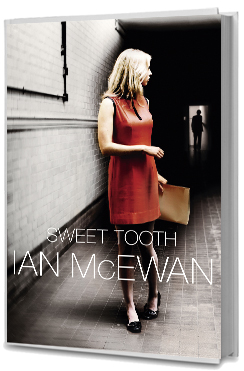 Sweet Tooth: A Novel by Ian McEwan
Sweet Tooth: A Novel by Ian McEwan
Nan A. Talese/Doubleday. 324 pages.
Lets be clear about this. “Sweet Tooth,” McEwan’s fifteenth novel, and the fourth since his triumphant “Atonement,” is a work about writing that masquerades as a spy novel, a work about the business of spying and the emotional havoc spying wreaks on those who practice it, that is more witty and at times downright funny than filled with chills and thrills.
Yet it is thrilling. It’s thrilling because McEwan’s prose is so remarkable–smooth as velvet, vivid as a motion picture–and because embedded in the novel is the story of spy-crossed lovers that is surprisingly moving.
The book’s heroine is the “rather gorgeous” and rather gauche Serena Frome, a bishop’s daughter and graduate of Cambridge University, who gets a low-level job with Britain’s MI5 during the Cold War. Serena has studied math at university, but her favorite pastime is reading fiction. She’s always “looking for a version of myself,” she tells us, “a heroine I could slip inside as one might a pair of old shoes.”
She gets her job with the intelligence service thanks to the intercession of her first real lover, a middle-aged intelligence operative who dies under mysterious circumstances. But while the rather-ditzy Serena slowly becomes aware of unsavory doings at the agency, her daily life at MI5 is dull and demeaning. Despite her education, and because of her sex, she is assigned to file-pushing and even house-cleaning chores. But her fortunes change when the agency, upset by the increasingly left-leaning British intelligentsia, decides to secretly offer large grants of money to writers likely to express positive thoughts about capitalism in their work. Serena’s passion for literature has been noticed by a higher-up, and she is chosen to recruit a young short story writer, Tom Haley, who is thought to have right-wing views. Serena is instructed to meet with Haley and offer him a grant, but under no circumstances reveal that MI5 is behind the money. She devours his work, is awed by his talent, and when she meets him, falls in love with him.
Here’s where the novel really takes off. How will Serena tolerate lying to the man she loves and endure keeping him in the dark about the political motives behind the grand literary stipend he is awarded? And, will she be able to keep him from antagonizing MI5 and losing his funding once he embarks on a dystopian novel that suggests the decay of Western civilization?
The progression of the love affair between the writer and the novice spy is filled with the twists and turns that make love such a complex matter. The complexity of love spurs McEwan to deliver such delicious epigrams as, “Love doesn’t grow at a steady rate but advances in surges, bolts, wild leaps.” And the advances, surges and wild leaps in this particular love story will keep you turning pages.
The denouement is a surprise (no spoilers here). And although you may be able to guess what Serena’s answer to Tom’s last question to her will be, she’ll have become so real and important to you that you’ll wish you could actually hear her answer.
![]()
 The Voice Is All: The Lonely Victory of Jack Kerouac by Joyce Johnson.
The Voice Is All: The Lonely Victory of Jack Kerouac by Joyce Johnson.
Viking. 471 pages.
This fascinating exploration of the rise to literary prominence of the novelist, Jack Kerouac, who was known as the voice of the Beat Generation, is written by a woman, a novelist in her own right, who had a two year affair with Kerouac, just before he published “On the Road.” Johnson has already written a prize-winning memoir about their liaison, “Minor Characters.” But nearly some fifty years after the affair, years during which she waited to no avail for some scholarly biographer to write a biography of Kerouac that would definitively declare him the major talent she believes him to be, she decided to write her own.
Johnson’s Kerouac is not the automatic writer of Beat Generation mythology, the man who sat down and in a caffeine-fueled typing marathon composed the vivid and lyrical “On the Road.” “Spontaneous bop prosody,” the poet Allen Ginsburg called it. “He just spewed his words on paper!” the singer Patti Smith said. “It isn’t writing, it’s typing,” Truman Capote scoffed. Johnson disputes this, revealing the arduous work that went into the composition of “On the Road.” Kerouac, she tells us, had begun writing in high school, had completed a 77-page segment of a football novel by the time he was sixteen, and in the years before writing “On the Road” had studied and even at times attempted to emulate some of the great writers he admired: Hemingway and Thomas Wolfe, Victor Hugo, Balzac, and Proust. “On the Road” was rewritten from scratch five different times, and “each paragraph had to be a poem, each sentence a breath of separation of the mind.”
Kerouac, who grew up in working-class Lowell, Mass., was of French-American descent, and grew up speaking not just English, but joual, “a powerfully direct and emotionally expressive” patois. It was, Joyce says, Kerouac’s “genius to find his voice,” a voice that “matched his vision–the reason we will continue to read him. His works live on, while the Beat Generation has not existed for a very long time.”
But it is Johnson’s voice that makes this book a good read. She is at once both intimate with her subject and yet thoroughly versed in all the reams of material that have been written about him by his contemporaries. Her voice brings us as close to Kerouac as we are ever likely to come.
![]()
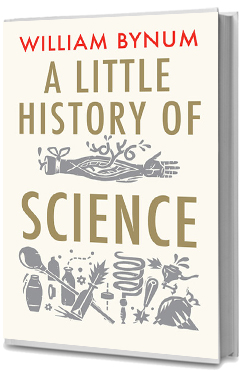 A Little History of Science by William Bynum.
A Little History of Science by William Bynum.
Yale University Press. 256 pages.
I don’t know about you, but if you’re anything like me, you often feel there’s a black hole in your brain when it comes to understanding news reports that talk about “the human genome project,” or “quarks,” or “bosons,” or, for that matter, “black holes.” William Bynum, an Emeritus Professor of the History of Medicine at University College in London has written a tiny little book that will tell you in just a few hours’ reading the history of and the latest developments in astronomy, biology, physics, geology, pharmaceuticals, and many other areas of scientific knowledge.
Bynum has a light touch. His daunting subject matter is leavened with anecdotes, like this one about a certain James Clerk Maxwell, a mathematical physicist who is apparently as important in the field of physics as Einstein: At dinner parties, his wife was given to saying, ‘James, you’re beginning to enjoy yourself; it is time we go home,’ and she’d shunt him off to his laboratory.
His style is clear and direct. His chapters short. And his history fun. As far back as the time of the ancient Greeks, Bynum tells us, doctors observed that some diseases were self-limiting; they got better on their own through the body’s attempts to heal itself by such things as sweating, bringing up phlegm, and vomiting . And to this day, “Doctors sometimes joke among themselves that if they treat a disease it will be gone in a week, but if they don’t it will take seven days.”
Bynum’s book won’t tell you everything you want to know about his various subjects, or understand the torrent of talk these days about medical ethics and cloning and cyber attacks. But, it may inspire you to read more deeply on, say, whether or not to get your genes sequenced, or whether or not to demand an antibiotic for that scratchy throat you can’t seem to shake off. And it will certainly give you the vocabulary to understand and join in the conversation.
![]()
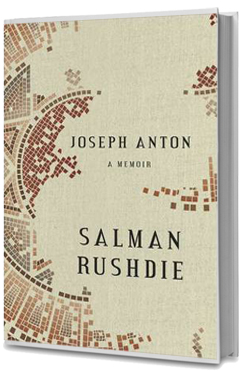 Joseph Anton:A Memoir by Salman Rushdie.
Joseph Anton:A Memoir by Salman Rushdie.
Random House. 636 pages.
Rushdie was already a celebrated author when, in 1989, his fourth novel, “The Satanic Verses,” was published, and Iran’s Ayatollah Khomeini, condemning the book as blasphemy against Islam, issued a fatwa calling for the author’s death. His existence threatened, Rushdie, who lived in London, had to go into hiding, and even change his name. He chose the moniker Joseph Anton, combining the names of two of his most beloved authors, Joseph Conrad and Anton Chekhov. His memoir, Joseph Anton, written in the third person, is principally the story of how he endured the nine years in which he was a wanted man, though there are sections about his childhood in India, his emigration to England, his early literary career and, when he was finally released from the doom hanging over him, his life as a free man in America.
I found the central matter of the book fascinating. When “Verses” first came out, no one in the West perceived the novel as potentially insulting to Islam. But some Muslims in India protested that the book be banned, and with wildfire speed–just as we’ve seen happen today with Muslim outrage over the YouTube film, “Innocence of Muslims,”–Muslims all over the world, including in England and America, were demanding Rushdie’s death. The British government offered Rushdie protection, assigned him arms-toting security guards, but insisted he moved out of his home and into what ultimately became a disorienting series of safe houses, often out in distant rural parts of the country. Rushdie had a young son in London. In order to see his child, he had to meet him secretly in the homes of various London friends who risked danger to themselves to let father and son unite. When things went wrong with the plumbing in one of the safe houses he had to hide ignominiously in a closet. At another house, when a housecleaner arrived to do her work, he had to hide in a locked bathroom. After that, he and his guards decided that from then on they would do the housecleaning themselves.
But the worst of Rushdie’s travails was the way public opinion turned against him. He persistently defended his book on the grounds of its literary merit and invoked England’s long history of upholding free speech. But, he soon found himself ostracized even by fellow intellectuals. He had insulted the Muslim religion, many of them argued; he “knew what he was doing,” and had brought what happened upon himself. It was a case of blame the victim. The Thatcher government, although providing security, seemed to hold him responsible for the turmoil in the cities. The Archbishop of Canterbury declared, “We must be more tolerant of Muslim anger.” Newspapers and TV channels in this country that had long ago rid itself of the death sentence gave pages and airtime to self-appointed “religious leaders” saying such things as Rushdie “must be killed“ and even “death, perhaps, is a bit too easy for him.”
All this was before 9/11. Before the West had come to understand that we had an enemy determined to put an end to our traditional beliefs in the separation of church and state and the right to free expression.
I don’t admire everything in this book. Rushdie treats various of his wives with contempt, and takes little responsibility for his own role in some of his many marriages’ falling apart. He is vindictive toward those of his publishers who, themselves and their staffs receiving death threats, declined to publish his next books. When he gets to America, where he becomes a fixture at society events, he is irritatingly star struck.
But, he is a brilliant writer, a brave man, and a prophet who early perceived the dangers inherent in society where it’s politically incorrect “to criticize the militant stridency of [Islam] in its contemporary incarnation.” I found the book difficult to put down.
![]()
Enter to win a book of your choice by answering in the comments below: Which one of Linda’s fall picks would you most like to read?
Five FOFs will win. (See all our past winners, here.) (See official rules, here.) Contest closes October 25, 2012 at midnight E.S.T. Contest limited to continental U.S. residents only.


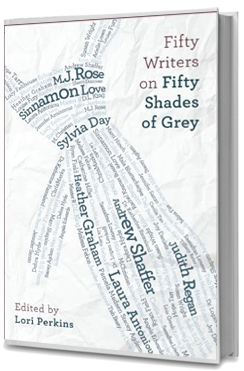
0 Responses to “{FOF Book Critic} 5 books to fall in love with this autumn”
Gerald says:
Very important to remember is not to try to understand women. Those that didn’t jump on board wound up standing in a long line, waiting
their turn. Fourth when you are in the bedroom, keep your sex life interesting
and passionate.
My web site … ways to turn on guys
Vivian Rosenberg says:
Sweet Tooth—I love Ian McEwan–
but I’m also fascinated by the 50 Shades phenomenon. Is this good for ever-changing perspectives on romantic love? I’d like to see what others say. (I worry about my granddaughters….)
scarlette monahan says:
would love some new reading material
Charlene Kuser says:
I would like to read Sweet Tooth: A Novel by Ian McEwan
shirley zolenski says:
I like sweet tooth
Sand says:
I would like to read: Sweet Tooth: A Novel.
James Coyne says:
a little history of science
Buddy Garrett says:
I would like to read Fify Writers on Fifty Shades of Grey.
Trisha McKee says:
Fifty Writers – I am so interested in seeing what others have to say. I was downright horrified by the writing and not at all impressed with the “sensual” scenes.
Beverly Metcalf says:
I would like to read Fifty Writers on Fifty Shades of Grey. Thanks for this giveaway.
Ashlea H says:
I’d like to read Salman Rushdie’s book – read a short article about it and it was fascinating.
Vicki D. says:
The Voice is All is the book I’d like to read. I like to read about real people.
Ed Nemmers says:
I so enjoyed “Atonement” and “On Chesil Beach, so I would select “Sweet Tooth”!
Diane Baum says:
I would like to read Sweet Tooth
bamr07 says:
I would like to read, Sweet Tooth: A Novel by Ian McEwan.
susan smoaks says:
i want to read them all but first i would read I love anything by Ian McEwan
techeditor says:
OH NO! I missed this–JUST MISSED IT.
Well, I would have said I want to read SWEET TOOTH by Ian McEwan.
At least you can sign me up for your emails.
James says:
I cant decide between the last three books in the list! I guess if I was forced to pick one, it would be The Voice Is All: The Lonely Victory of Jack Kerouac by Joyce Johnson.
Susan Smith says:
Sweet Tooth
Amy says:
Fifty Writers! These all look like great reads
Jen says:
I’d love to win the 50 on 50
Diane Baum says:
Sweet tooth please
peter gladue says:
The Voice Is All: The Lonely Victory of Jack Kerouac by Joyce Johnson.
Laura P. says:
They all sound great but I think I would enjoy Joseph Anton or A Little History of Science the most.
Thank you,
bookloon at gmail dot com
Anice Stonerock says:
I’d like to read Sweet Tooth: A Novel by Ian McEwan. Thanks for asking.
KAREN COGBURN says:
Fifty Writers of Fifty Shades of Grey.
Melinda Lee says:
Definitely A little History of Science. It is my kinda book.
l says:
Sweet Tooth. After reading Atonement, I’ve been gradually reading more of his books. If I received one, I’d definitely work that to the top of my list.
Earle says:
I’ve been surfing online greater than 3 hours lately, but I never found any interesting article like yours. It is beautiful worth enough for me. Personally, if all webmasters and bloggers made good content material as you probably did, the net might be a lot more useful than ever before.
Feel free to surf to my site … anunturi.Ws
kathy says:
I would love to read and keep for future questions, A Little History of Science.
janet lindsey says:
sweet tooth
Shannon Baas says:
Sweet tooth.
Pam says:
fifty Shades of gray
Marilyn Wons says:
The book “Sweet Tooth” sounds good to me!
Pamela Behrend says:
I think I would like to read Sweet Tooth most although I would like to read them all. Love to read!
yyoerger says:
Joseph Anton. I’ve read so much about Rushdie and heard or seen so many media interviews, I’d like to get his own take on his life in his words. Like the reviewer, I don’t admire everything about him, but what an upheaval of one’s entire life to have to endure.
Onehsancare says:
I am seriously reducing my chance of winning, but I have to say Sweet Tooth. McEwen always challenges and satisfies me.
A Little History of Science will be a great read, too–after I finish Sweet Tooth!
Ying says:
Fifty Writers – definitely. I have read the Fifty Shades trilogy more than once and I must say I really enjoyed them. They will not win the author any literary prize but for sure will make her rich (if she is not already). I think, for most women who had read the books, it is not its eroticism or “mommy porn” that excites them; but rather Christian Grey himself and his persona which is the real turn-on. He is handsome (and very sexy), rich, intelligent, generous…
Christine Norman says:
A Little History of Science
Jewel Hopson says:
After reading the very serious, eye openning, and sad-make-you-mad-and frustrated The New Jim Crow, by Michelle Alexander, I’m ready to be entertained by Ian McEwan’s Sweet Tooth.
Lisa Richardson says:
I think I’d like to read Sweet Tooth most of all, just because it’s Ian McEwan! The other books all sound like they would be really interesting, especially the Kerouac book.
gailyn says:
I would like to read,” A Little History of Science” by William Bynum.
Angela Mogin says:
Joseph Anton
Maureen O'Neal says:
I think the Ian McEwan book sounds MOST tempting, but they all sound great!
Diane F says:
Sweet Tooth. Ian McEwan intriuguing and addictive.
Roz Rickman says:
Choice is “Sweet Tooth”. Has a number of intriguing topics going on — romance, spying, “feelings”, and appears to be a real “page turner”. Just love books like this !!
Kathy says:
I would love to win Sweet Tooth. I finally just read Atonement and have become a McEwan fan! I’m always looking for new books to recommend to my book club.
Kate G. says:
I would most likely read Sweet Tooth as I really need a diversion right now. The last couple of books I have read have been very depressing.
smfsprout says:
They all make my TBR list, but I would have to start with Sweet Tooth: A Novel by Ian McEwan and then work my way through the list.
mary ann says:
Sweet Tooth
MoonRae says:
They all sound like great reading!! I’m going to choose something a little different for me and go with A Little History of Science
Mary G says:
“Sweet Tooth” please. I love Ian McEwan.
BlueBear says:
I’m a science geek and I know what the Higgs Boson is so I’d like to read “A Littler History of Science.”
Carole Maiello says:
I most want to read the Fifty Writers on Fifty Shades. I just finished the trilogy and it left many questions iin my mind. I would love t hear what others are saying about it.
BlueBear says:
I am reading the second book of “Fifty Shades of Gray” and find it very compelling. The girl intrigues me very much and I’m very interested in seeing whether or not Gray can overcome his “proclivities” and be true to his promises to her. Yes, there is a lot of sex but there is a psychological story there too. I’m loving it!
ktpotat says:
Sweet Tooth because I love atonement
Elaine says:
Sweet Tooth
Margarida says:
I would like to read Joseph Anton’s Memoir because he led such a fascinating life.
Fran Kahn says:
I would most like to read Joyce Johnson’s THE VOICE IS ALL. I’m a Kerouac fan and would love to explore a deeper insight into his writing influences.
Jan T. says:
Fifty Writers, I too read this book when it was Master of the Universe on Fan Fiction and I am deeply invested in the story and what others think about it.
Julie Durkin says:
I love anything by Ian McEwan because he can take any genre and make it his own, with style and wit.
Christine says:
like A Little History of Science